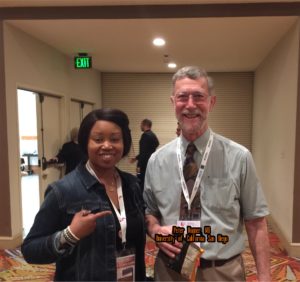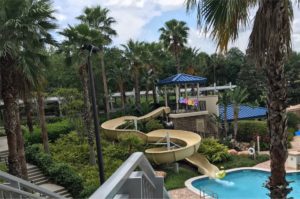Importance of Outreach
 The Experimental Biology conference is here again! This year we donned on the wonderful city of Orlando, FL (April 6-10, 2019) where we fill the air with all topics physiology. Generally, we only look at the research portion of meetings/science, but what about the future generations that are to come up after us? The American Physiological Society has implemented initiatives to address that question. I spend my day following the PhUN (Understanding Physiology) sessions where undergraduate students presented their summer research projects and K-12 teachers learned how to incorporate physiology in the classroom.
The Experimental Biology conference is here again! This year we donned on the wonderful city of Orlando, FL (April 6-10, 2019) where we fill the air with all topics physiology. Generally, we only look at the research portion of meetings/science, but what about the future generations that are to come up after us? The American Physiological Society has implemented initiatives to address that question. I spend my day following the PhUN (Understanding Physiology) sessions where undergraduate students presented their summer research projects and K-12 teachers learned how to incorporate physiology in the classroom.
During the PhUN session, there were about 50 outreach people presenting 25 posters. Some of the attendees made enlightening statements about the event. For example, Dr. Noah Marcus has participated in this event for several years, but since conferences can be a bit overwhelming and busy, he took a break from conferences but could not stay away. Dr. Marcus stated, “One interesting thing about PhUN week is that it does not only focused on the activities the scientist conducts in the classroom, but also how effective the lectures/labs are at the school the activities were conducted.” Furthermore, he suggests formulating partnerships with museums and local institutions. From a teacher’s perspective, Jane Schuster, a teacher from a local FL school system and Physiology Workshop for Life Science Teachers participant, had positive things to say about the Outreach program. Jane stated, “This program has assisted in obtaining connections from other teachers, how they get resources, as well as how to incorporate current research in the class instruction.” She was excited to report that her research professor to came to her classroom for PhUN week, leading to increased student enthusiasm in regard to how the sciences are used in the real world.
 As an Outreach Fellowship recipient from the APS and a vascular scientist, I participated in PhUN week at Sale Elementary School in Columbus. Being that PhUN week was focused on cardiovascular disease, I took a box of lab supplies out to the school to teach the students lab safety, how to collect primary cells, prepare them for slides, and view them under the microscope. I spent the last two days teaching how we use their classroom math in protocol formulation and subsequently writing techniques to summarize the findings. As serendipity would have it, the students were on a section that were easily translatable to what I prepared as talking points.
As an Outreach Fellowship recipient from the APS and a vascular scientist, I participated in PhUN week at Sale Elementary School in Columbus. Being that PhUN week was focused on cardiovascular disease, I took a box of lab supplies out to the school to teach the students lab safety, how to collect primary cells, prepare them for slides, and view them under the microscope. I spent the last two days teaching how we use their classroom math in protocol formulation and subsequently writing techniques to summarize the findings. As serendipity would have it, the students were on a section that were easily translatable to what I prepared as talking points.
I would encourage people to do more outreach in schools. In these situations, scientists are preparing future generations of researchers, as well as training young learners to be prepared for what awaits them in college and the workplace. I have taught students from K-12, community college, university, and Adult Education to English as a Second Language, so I can say that seeing the students at different stages, one can appreciate the importance of supporting the educational process to take some of the burden off the instructors.
Quite a bit of my time has been spent preparing for this meeting and participating in K-12, but I will spend the last days of the meeting focusing more on vascular science. There is a lot of the APS Heart and Circulatory section that has a wide range of oral and poster sessions to cover, and I hope you all find news worthy.
Continue to follow me on Twitter for meeting highlights and post any comments or questions you may have. @AnberithaT